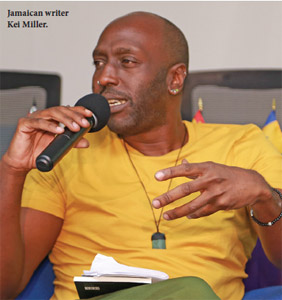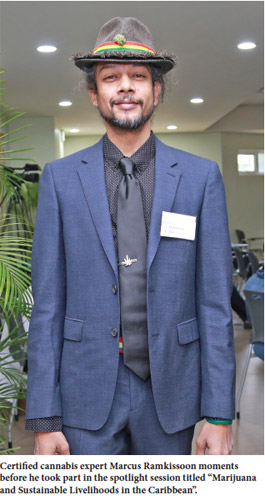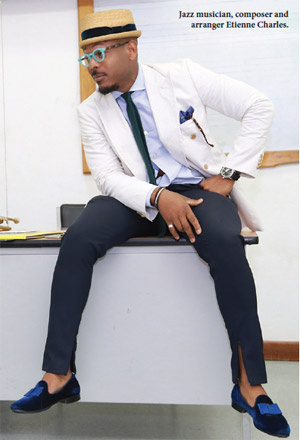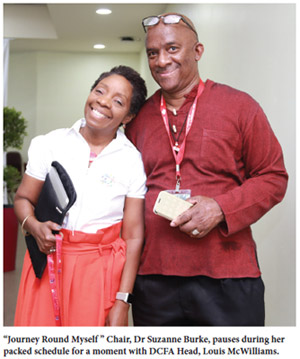
 At this year’s 14th biennial Caribbean Festival of Arts (Carifesta), UWI St Augustine played a major role in revamping the tradition of regional scholarship by hosting the symposia “Journey Round Myself: Crossing Borders, Strengthening Connections, Breaking Boundaries.” At this year’s 14th biennial Caribbean Festival of Arts (Carifesta), UWI St Augustine played a major role in revamping the tradition of regional scholarship by hosting the symposia “Journey Round Myself: Crossing Borders, Strengthening Connections, Breaking Boundaries.”
The four-day event held from August 19 to 22 during the week-long festival was headquartered at the Department of Creative and Festival Arts (DCFA) and included numerous master classes, workshops and 89 paper presentations by scholars from regional institutions including the Universities of Guyana and the British Virgin Islands, UWI Cave Hill and the Edna Manley School of the Performing Arts in Jamaica.
Although symposia have been a part of Carifesta since its 1972 inception, “Journey Round Myself” Chair, Dr Suzanne Burke, said the tradition had waned.
“We have found that over the years the role of symposia has been marginalised and the emphasis is more on the performative aspect of who we are as a people. What we’ve tried to do with this staging of Carifesta is reengineer the symposia as a central piece of discussing Caribbean creativity,” said Dr Burke, who is also Cultural Studies Lecturer in UWI St Augustine’s Department of Literary, Cultural and Communications Studies in the Faculty of Humanities and Education.
 The symposia theme celebrated the 20th anniversary of a seminal article of the same title by playwright and historian Errol Hill, which focused on the importance of national theatre. “(Hill) said that for us to be able to envision ourselves as Caribbean people and be Caribbean people in the world, the arts had to play a central part; but for us to do that we have to be self-reflective and interrogate. We can’t operate in silos. It was only fitting at the 20th anniversary of this seminal article that we again look within to reach out,” Burke added. The symposia theme celebrated the 20th anniversary of a seminal article of the same title by playwright and historian Errol Hill, which focused on the importance of national theatre. “(Hill) said that for us to be able to envision ourselves as Caribbean people and be Caribbean people in the world, the arts had to play a central part; but for us to do that we have to be self-reflective and interrogate. We can’t operate in silos. It was only fitting at the 20th anniversary of this seminal article that we again look within to reach out,” Burke added.
True to its theme, the symposia broke boundaries with the inclusion of practical workshops and master classes on topics ranging from the business of art to the building of Ramleela effigies. Conventional scholars shared spaces with the likes of musician Etienne Charles, playwright Tony Hall, Ramleela artist Trevor Seunarine and dancer Marlon Simms, artistic director of the Jamaican National Dance Theatre Company.
“We are trying to bridge that gap that we sometimes see in the cultural ecology between what we as academics write about and do and what the artists actually practice and the activism that can emerge if we do those kinds of things together,” Burke explained.
Burke’s sentiments were reiterated by Dr Heather Cateau, Dean of the Faculty of Humanities and Education in her address at the symposia opening. She said the university was a “natural home” for regional symposia adding that The UWI and Carifesta have a common history both socially and politically.
“Both the UWI and CARIFESTA provide a critical forum for the integration and development of the people of the Caribbean. We both feel in our hearts the need for self-affirmation as a people, the need to deepen awareness and knowledge, the need to facilitate documenting and assimilation of art, culture and the work of our artists and artisans. We are both in the business of education by bringing the very best professionals, researchers and masters in their fields and our young people together,” said Cateau.
“We both understand the importance of creative and cultural industries not just for historical, social and political reasons; we also see their economic value. Perhaps most importantly we fully understand that we can never achieve true and holistic economic development without this sector. It is clear to me that this is what has been lacking on all our development stages thus far. Just maybe we will get it right this time.”
Thinking critically about art
 The symposium was not the end of DCFA’s Carifesta involvement. DCFA lecturer and Visual Arts Unit Coordinator Dr Marsha Pearce also curated an exhibit for the visual arts segment of the festival held at the National Academy for Performing Arts (NAPA). Titled “Enter the Picture” the exhibit featured six recent graduates of the Visual Arts Programme: Reanna Ali, Alex Kelly, Sarah Knights, Shane Hanson Mohammed, Christopher Ross-Dick and Marinna Shareef. The featured works engaged subject matter such as consumerism, illusions of progress, identity and bipolar disorder. The symposium was not the end of DCFA’s Carifesta involvement. DCFA lecturer and Visual Arts Unit Coordinator Dr Marsha Pearce also curated an exhibit for the visual arts segment of the festival held at the National Academy for Performing Arts (NAPA). Titled “Enter the Picture” the exhibit featured six recent graduates of the Visual Arts Programme: Reanna Ali, Alex Kelly, Sarah Knights, Shane Hanson Mohammed, Christopher Ross-Dick and Marinna Shareef. The featured works engaged subject matter such as consumerism, illusions of progress, identity and bipolar disorder.
While Pearce felt fortunate for the opportunity to showcase these “practitioners to watch” on a large platform, she believes there needs to be more space created for greater complexity and a more nuanced representation of the Caribbean through the arts. “Festivals in their ideal form should be spaces of creative experimentation and not what is ordinary or what we are used to. It’s the ideal space to expose audiences. But it is not just a joyous celebration without criticality and reflection or just about the audiences relaxing without being challenged,” she said. “Enter the Picture” aimed to both expose audiences to new ideas and challenge notions of Caribbean realities. The exhibit included interactive installations, allowing patrons to further engage with the complex subject matter.
While acknowledging the importance of the symposia, Pearce felt that academia has not been fully integrated into the discourse of Carifesta. “The university needs to continue to inject that greater element of research and a critical eye to all art forms into Carifesta that’s not confined to symposia or formal presentations. It should be felt in the other programming as well so that it’s not just seen as a space of escape or abandonment.”
Students, graduates shine
UWI students not only attended the event, but many were featured in the programming.
DCFA alumni, artist and filmmaker, Kenderson Noray debuted the short film Voices at the Carifesta edition of the Trinidad and Tobago Film Festival (TTFF). Voices is a coming-of-age story of a young man raised in a rural fishing village who has to come to terms with the generational gap between father and son. Noray said Carifesta provided him with a unique opportunity and experience. “It was eye-opening. I got to see and experience the cultures of many islands and make friends. I got more exposure and it’s a story that not only Trinidadians can relate to but it’s relatable across the Caribbean.”
Leeanna Boyce, the artist, DCFA graduate and school teacher from Moruga that was featured in the March 2019 issue of UWI Today (“Fassness, flair and a deep deep love of culture” https://sta.uwi.edu/uwitoday/archive/march_2019/article10.asp) installed her Folk Characters Haunted House at the Carifesta Youth Village. It was a terrifyingly magical experience for many attendees.
 “I honestly was not expecting it to go so far,” Leeanna said of the enormously positive reception she received. “I am really thankful to Dr (Jo-anne) Tull (Lecturer and Coordinator of the Carnival Studies Unit at DCFA) for pushing me to do this. In the March article it was revealed that The UWI graduate’s innovative take on the traditional haunted house was so well received that Community Development, Culture and the Arts Minister Dr Nyan Gadsby-Dolly invited Leeanna to mount it at Carifesta XIV. “I honestly was not expecting it to go so far,” Leeanna said of the enormously positive reception she received. “I am really thankful to Dr (Jo-anne) Tull (Lecturer and Coordinator of the Carnival Studies Unit at DCFA) for pushing me to do this. In the March article it was revealed that The UWI graduate’s innovative take on the traditional haunted house was so well received that Community Development, Culture and the Arts Minister Dr Nyan Gadsby-Dolly invited Leeanna to mount it at Carifesta XIV.
A Caribbean festival
The Caribbean Festival of the Arts (Carifesta) is a biennial festival hosted by the Caribbean Community (Caricom). The earliest version of the festival was held in San Juan, Puerto Rico in 1952. A similar staging of the festival was also held in Trinidad and Tobago to commemorate the creation of the West Indies Federation in 1958. Carifesta in its current institutional structure was first held in Guyana in 1972. Since then, seven other Caricom member states and Caribbean countries have hosted the event – Barbados, Cuba, Haiti, Jamaica, St. Kitts and Nevis, Suriname, and Trinidad and Tobago.
Carifesta 2019 was Trinidad and Tobago’s fourth time hosting the event which was also held here in 1992, 1995 and 2006. The Carifesta 2019 theme was “Connect. Share. Invest” focusing on both the tangible and intangible aspects of cultural heritage and development. This year’s festival included over 200 activities hosted countrywide, ranging from theatre arts, dance, community tours, craft, trade and technology expos, art exhibits, fashion shows, live music and a film festival. All these events were made possible through partnerships with over 20 organisations including Boca Lit Fest, TTFF, the Environmental Management Authority, and the National Library and Information Systems Authority.
|





